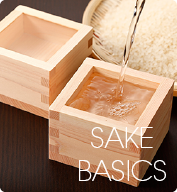Ippongi Sake Brewery
Location

Ippongi Brewery is located in Katsuyama-shi, Fukui prefixture, one of the most snowiest regions in Japan on the foothills of Mount Hakusan. It is also well known for the most findings of dinosaur fossils. The region's history dates back about 1300 years, when the Heisenji Temple was founded by Mt Hakusan worshippers. By the 15th century, Heisenji Temple had an enormous influence upon the central government. To this day, many historical artifacts are still excavated. With these historical backgrounds and the plentiful nature, Katsuyama-shi has been ranked 9th on the Forbes Magazine's "World's Most Beautiful Cities", and 1st place in Asia.
One of Japan's best rice growing regions

Katsuyama-shi, together with the adjacent Oono-shi, is called the Oku-Echizen Region. Oku-Echizen, with its pure waters, fertile soils, and the ideal night and day temperature difference, mainly grows the "Gohyakumangoku" sake rice, highly sought after by all brewers. The famous "Yamadanishiki" sake rice is also grown here, not to mention the "Koshinoshizuku" sake rice, developed exclusively in this land. Out of Ippongi's "Denshin" line, "Rin/ Air of the brewery" and "Ine/ Rice field" are brewed from "Koshinoshizuku" sake rice, and "Yuki/ Snow" is a blend of "Yamadanishiki" and "Gohyakumandoku".
History of the brewery and about its sake

Ippongi's history dates back to 1902, when samurais still roamed the town. It originally brewed sake exclusively for the feudal lord of Katsuyama, and was given its name "Ippongi", meaning "ultimate truth", deriving from a zen proverb. Ippongi signatured "crisp, dry sake" from its establishment, and quickly became the top brand in Fukui prefixture, and has been to this day, close to a 100 years. Around 1950, it decided to take that concept a little further.
* About "Nanbu- Toji"
"Toji" is the brewmaster who commands the group of brewers, all specializing in their own fields. "Nanbu-Toji", together with "Echigo-Toji" and "Tanba-Toji" is one of the "Japan's 3 most prestigous Tojis", and has a history of more than 350 years. Their skills and craftsmanship is highly praised throughout the history of sake making.
PRODUCTS
DENSHIN RIN/AIR OF THE BREWERY
This is a sake with a rich aroma that carries undertones of peaches and lychee, and an elegant taste full of depth and freshness. This sake is one of the finest offered in the Denshin Series. This sake is brewed entirely using 'Koshinoshizuku' rice. First appearing in 2003, only 1000 bales of this rare variety of sake rice are produced a year, and it isn't distributed anywhere outside of Fukui Prefecture. Take just one sip, and you will perhaps think of this as not just a sake but as a work of art.

DENSHIN YUKI/SNOW
This sake features a calm fragrance and pure dry taste. When you sip this sake, scenes of a quiet, snow-covered sake factory might drift to your mind. This sake is brewed using 'Yamadanishiki' and "Gohyakumanngoku" rice. Denshin Yuki's tranquil aroma and clear dry taste has garnered enthusiastic support not only from customers who enjoy dry sake, but also from chefs who seek an appropriate sake to accompany fine cuisine.

DENSHIN INE/RICE FIELD
This sake features a smooth feeling with soft dry taste. When you sip this sake, you might imagine a field of mature rice plants swaying gently in the breeze. This sake is brewed entirely using 'Koshinoshizuku' rice. First appearing in 2003, only 1000 bales of this rare variety of sake rice are produced a year, and it isn't distributed anywhere outside of Fukui Prefecture. Once a sake aficionado has become accustomed to the many varieties of sake, he gradually begins to prefer a sake with fine taste and distinct flavor rather than heavy aroma. Denshin Ine is such a sake, and when we put the sake aficionados' discerning palates to the test, they were very moved by this sake's soft texture and relaxing taste.


GINKOUBAI
To express the taste in one phrase, it is Sweet and Elegant. Unlike the average plum sake which often has a heavy taste, Ginkoubai offers a lighter harmony of flavor between sweet and sour. Plum sake is usually made by soaking plums and sugar into distilled alcohol,causing the taste to become thick like honey. However the process used to make Ginkoubai differs from this completely. We first wait for the plum to reach full maturity, then to extract only the pure plum juice, we press them slowly by using SAKEFUNE a gentle pressure machine used normally in the production of regular sake. Next we blend this pure plum juice with sugar and Junmai sake, and it is through this that Ginkoubai is able to attain its lighter flavor and elegant sake undertones.
GINKOUBAI HANNYA TOU
Take a sip, and following the initial full-bodied sweetness enjoy the bold spicy flavor that spreads through your mouth. Guaranteed before now you've never experienced a flavor quite like this. Just one drink and you'll be hooked, and wanting to recommend it to all of your friends.






